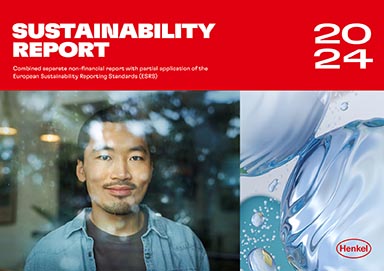
HENKEL has published its sustainability report for 2024. The company has advanced further, especially in the areas of climate protection and circular economy, but also in social issues. Already this year, Henkel voluntarily reports in line with the content-related requirements of the European Union’s new Corporate Sustainability Reporting Directive (CSRD) and its European Sustainability Reporting Standards (ESRS).
“We have made great progress and delivered tangible improvements in sustainability over the past year — across all areas of our sustainability strategy,” said Carsten Knobel, CEO of Henkel. “Even in challenging times, we stand by our fundamental values: through our products, processes, and contribution to society, we are committed to a more sustainable world. This is also reflected in our net-zero roadmap aimed at reducing our greenhouse gas emissions by 90 percent by 2045.”
“I am proud of our progress on key sustainability initiatives,” said Sylvie Nicol, executive vice president human resources, infrastructure and sustainability. “In 2024, for example, we have increased the proportion of recycled plastic in our consumer goods packaging to 25 percent. And we introduced gender-neutral parental leave of at least eight weeks with full pay worldwide — which has received an excellent response. In addition, we have implemented the first sustainability report in line with the content requirements of the new ESRS, which has also further improved our internal processes.”
New targets for climate protection
By the end of last year, Henkel had reduced CO2 emissions in its production per ton of product by 64 percent compared to the base year 2017 and increased the energy purchased from renewable sources to 47 percent.
Henkel also set Net-Zero targets last year, which cover a larger part of the value chain than its climate targets before. By 2045, Henkel aims to reduce its absolute scope 1, 2 and 3 greenhouse gas (GHG) emissions by 90 percent. As short-term climate targets, Henkel plans to reduce its absolute scope 1 and 2 GHG emissions by 42 percent and its absolute scope 3 GHG emissions by 30 percent by 2030 (compared to 2021). The new targets have been validated by the Science Based Targets Initiative (SBTi), a climate change organization that supports companies in setting GHG reduction targets that are in line with the Paris Climate Agreement. By the end of 2024, Henkel had reduced its scope 1, 2 and 3 GHG emissions by 20 percent (compared to 2021).
To further decarbonize the value chain and better capture CO2 emissions in the supply chain (scope 3), Henkel accelerated its engagement program for its global suppliers last year. It collects emissions data and defines specific measures to reduce emissions.
See page 33 of our April/May 2025 issue on our Back Issues page.

